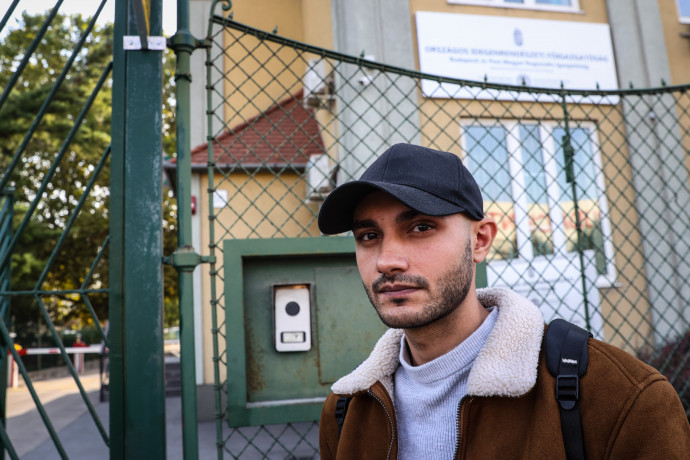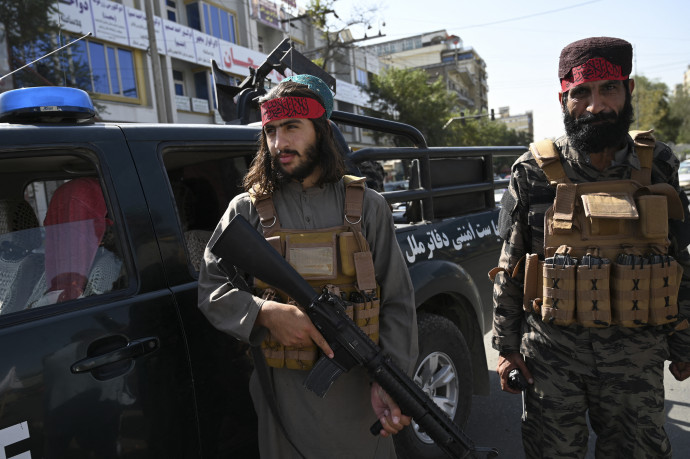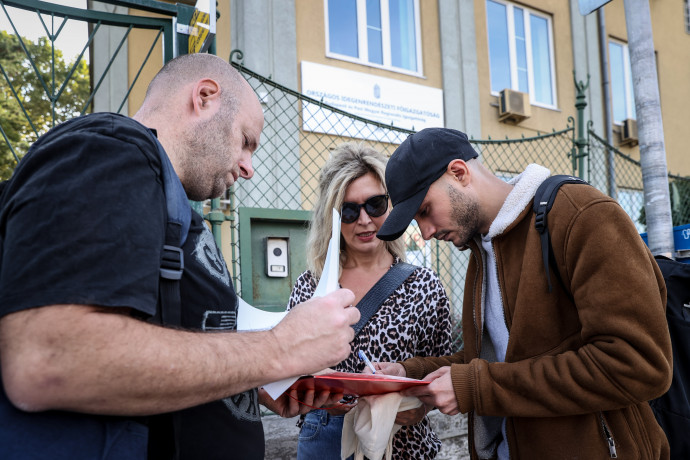He had never been to Serbia in his life, he did not know anyone there, and yet he was pushed-back there

„I just want to work and study”, Afghan Hasib stressfully told me a few days ago at the National Directorate-General for Aliens Policing Asylum Customer Service Office when he submitted his asylum application. His greatest fear then was being imprisoned. His situation then took an even more dramatic turn: he was detained, put in a police car and pushed-back into Serbia. He has never been to the country in his life, does not have any relatives or acquaintances there, and he does not know a word of Serbian. (Translated by Dan Swartz)
I first met the 24-year-old Hasib three weeks ago. Showing up to our meeting wearing a black baseball cap, he spoke English with a slight accent but at a near-native level. Overall, he did not really correspond to the stereotypical image of migrants the Hungarian Government has been communicating over the past five or six years.
Hasib is timid and withdrawn. This is probably due to the fact that he has spent the past year and a half in constant fear, hiding from the authorities, and worrying about his own freedom as well as the safety of his family members who remained in Afghanistan.
Hasib was born in Afghanistan and grew up there before coming to Hungary to study. He attended Kardan University in Kabul, Afghanistan’s largest private university, where he majored in business management. After graduation, he also wanted to get a more competitive degree, so he decided to try his luck in Europe. He applied to universities in several countries but failed to obtain a visa for most places. However, he did get a visa for Hungary. In 2018, he was able to start his Business Administration and Management studies at János Kodolányi University (taught in English). Here, he also gained basic proficiency in the Hungarian language.
However, he was only able to complete three semesters before his father lost his job in Afghanistan and his family could no longer finance his studies in Hungary.
Hasib was forced to drop out of university, which is why his residence permit for the purpose of study expired. He was at a crossroads. He had to make a choice between either going back to Afghanistan or staying in Hungary illegally.
In the end, on the advice of the family, he opted for the latter.
Returning home was not an option
Although according to his own account, he missed his family very much and spoke to them every day, he knew well that the risk would be smaller if he stayed in Hungary than if he went back to American-controlled Afghanistan, because his family has been a target of the Taliban for decades.
Hasib was one year old when his family fled to Pakistan after his father was shot in the street by the Taliban. After the invasion of US troops in 2001, the family decided to return to Kabul. The family belonged to the post-Taliban Afghan elite, so Hasib was able to grow up in Western conditions. Female members of his family also worked or studied.
His father worked for the pro-American Afghan Government in the country’s Finance Ministry. His male siblings worked at the Swedish Embassy, the Ministry of Agriculture, and in the management of the Afghan National Bank. The family became a target of the Taliban after one of his father’s brothers, Shafiq Ahmad Qarizada, became the country’s Deputy Finance Minister. There have been several attempts on Qarizada’s life in recent years, but so far he has managed to escape the attacks unharmed.
In 2016, the Taliban tried to abduct Hasib and one of his brothers in order to blackmail the Deputy Finance Minister.
Terrorists surrounded Hasib’s vehicle with their cars and wanted to take them hostage. Fortunately, they were close to their home and the security personnel guarding their house managed to rescue them. The Taliban later tried to kidnap several of Hasib’s cousins in a similar way.
In the same year, the Taliban also launched an attack on the international NGO where Hasib worked. Luckily for Hasib, the blast took place on a day when he was lying sick at home.
Ever since the Taliban took back power in the country a month ago, their family members have not dared to set foot outside their homes. After the Taliban killed several of the family’s rural relatives, they definitely want to leave Afghanistan. And of course, also because they want the female members of the family to be able to continue their studies.

They possess visas for surrounding countries, but since they are tied to the previous Government by a thousand strands, they probably would not be allowed to cross the border alive. Now they are hoping that, as promised by the Taliban, air travel in Afghanistan will resume in a few weeks. Maybe then they can leave the country by air.
He hid from the police for a year and a half
In the absence of a valid residence permit, Hasib’s decision not to go back to Afghanistan meant he was forced to hide for the past year and a half. He was stopped and checked by police on the street a few times, but he managed to talk himself out of the situation each time. Unable to rent an apartment without a residence permit, he stayed with acquaintances. The even bigger problem was that without papers he could not take a job and make any money either. Luckily, his parents were left with enough savings that they could at least send money to Hasib for food.
Due to the lack of work and study opportunities, he spent most of his days reading and watching TV series. He also sometimes played basketball with his friends. In the absence of a valid residence permit, and despite all his attempts, he was unable to get vaccinated, even though he was very afraid of COVID-19.
He has tried unsuccessfully to leave Hungary several times in the last year and a half. When he tried to leave for Croatia, he was taken off the long-distance bus at the border for not having a visa. However, he did not have either the money or the courage to entrust himself to a human trafficker and try to leave illegally in the direction of Austria and then Germany where he could have hoped to be granted refugee status.
After searching for a job without papers for many months without success, and it became clear that he would not be able to leave the country, he started looking for NGOs that help refugees and found the Hungarian Helsinki Committee. Hasib planned to submit his asylum application with the help of the organisation to the National Directorate-General for Aliens Policing at the end of August. With this decision, he took a serious risk, because it meant revealing to the authorities that he had lived illegally in Hungary for the past year and a half.
Asylum regulations have been tightened due to COVID-19
If an asylum-seeker had tried to apply for asylum one and a half years ago, they would have been given a residence card for humanitarian purposes after the application was made, a personal interview would have been held, a national security check would have been conducted, and in the end, he or she might have been granted subsidiary protection or refugee status.
However, the European Court of Justice ruled last May that holding asylum-seekers in a transit zone was considered detention, consequently, the Hungarian Government closed the transit zones. Referring to the COVID-19 state of danger, it then introduced new asylum regulations. According to the new rules, it is not possible to apply for asylum in Hungary while on Hungarian territory until the state of danger is lifted. An application can only be made from outside the borders of the country at Hungarian embassies or consulates. The law allows very limited exceptions. Thus, Hasib could have prepared for three possible scenarios when submitting his asylum application:
- Under the asylum legislation, the responsible minister could have, in an instance of exceptional fairness, cite humanitarian reasons and recognise him as a refugee;
- Hasib could have been forced to travel outside the borders of the European Union (to Serbia or Ukraine) because he is an illegal immigrant and told to apply for asylum from there. It is called ‘push-back’ when illegal immigrants are forced back across the border immediately after entry and without being given the opportunity to apply for asylum. Since Hasib has never been to Serbia or Ukraine, a push-back in his case rather means a coercive ‘push-over’; or
- As he is an illegal immigrant, an expulsion procedure could have been initiated against him resulting in him being deported to Afghanistan. For the time of the deportation procedure, he could have been taken into immigration detention.
He waited in vain for hours at the asylum authority
Hasib and Helsinki Committee staff planned to file the asylum application on August 27, but the night before, the young man became ill from stress due to the possibility of detention and deportation and was eventually unable to go to the asylum authority.
On September 14, he finally managed to go to submit his application accompanied by us. His asylum application and passport were received by the National Directorate-General for Aliens Policing, but they refused to provide proof of this. We were told that the Director would decide what the next step would be.

Although the officers repeated every quarter hour that the Director would appear within minutes, we still saw no trace two hours after the request was made. During this nerve-wracking wait, it seemed that Hasib had failed to completely overcome the stress. He trembled and kept asking what would happen to him if he was taken into custody, whether he would be able to call his parents from detention. In the end, we left the asylum authority empty-handed.
Hasib was informed the next day that his fate would be announced on Friday, September 17. Standing in front of the asylum authority's Budafoki St. building on Friday, the young man seemed a degree calmer than on Tuesday. He said he was praying for a favourable decision to be made on his case. After I asked if he was deeply religious, he replied, not at all; he only prays when he is in big trouble.
The situation escalated on Friday
His prayers went unheard. The authority rejected his asylum application without making a substantive in-merit examination, arguing that according to the law, no asylum application can be submitted from the territory of Hungary. After the delivery of the decision, Hasib was turned over to the police and arrested immediately. First, he was taken to the Budapest XI. District Police Station, and then the Airport Police Directorate at Ferihegy.
Dr. Katalin Juhász, lawyer of the Helsinki Committee, tried to argue on the spot for an exception to be made to one of the aforementioned transitional laws (according to which it is not possible to apply for asylum from Hungary) that states that persons being affected by measures restricting personal liberty may also apply for asylum from Hungary (if they have entered the country legally). However, the police were not interested in this argument.
The lawyers of the Helsinki Committee appealed to the Budapest Court and the European Court of Human Rights for interim measures granting immediate legal protection to prevent the push-back that was already suspected to be in progress at the time. The police, however, did not wait for a court decision. Hasib was put in a police car at the Airport Police Directorate in the early afternoon and set off for the southern border to force him into Serbia. It made no difference that the young Afghan man had never been to Serbia in his life and did not speak the language at all.
It is indigestible both at the level of basic humanity and moral existence
Dr. Katalin Juhász, a lawyer of the Hungarian Helsinki Committee who has been dealing with Hasib’s case in recent weeks, told Telex:
„What happened to Hasib today before the asylum authority, and later in the presence of the police at the Airport Police Directorate, is not only legally unacceptable, but also indigestible at the level of basic humanity and moral existence. It not only points to the irrationality of the newly introduced asylum system, but also to the ruthlessness of the entire law enforcement system soaked in the Government’s xenophobic immigration policies.”
„I drew attention in vain to the judgments of the Court of Justice of the European Union and the European Court of Human Rights which declared the Hungarian practice of pushing-back asylum-seekers illegally residing in Hungary to beyond the Hungarian border, without examining their application, to be contrary to EU and international law. They replied they follow Hungarian law and not EU or international law”, Juhász added.
Moreover, according to Juhász, „The Hungarian authorities are not only disregarding the provisions of international law and EU law when they do not examine the asylum application of a Taliban-persecuted Afghan man – someone who is likely to receive international protection today in all countries with a functioning asylum system – but absurdly, they do not even follow the provisions of the new Hungarian asylum law”.

We received the news from the staff of the Helsinki Committee on Friday, September 17 at 17:45 that Hasib had been pushed-back into Serbia. „When we separated, all he asked was where he would sleep in Serbia”, Juhász said. „Neither I nor the police officer who forced him into Serbia could answer that”.
Hasib was able to contact Juhász late Friday night. He managed to access the Internet at a petrol station in the village of Kelebija on the other side of the border. Thanks to the Serbian partner organisation of the Helsinki Committee, the young Afghan man’s situation has begun to resolve.
The Helsinki Committee filed an appeal with the Budapest Court against the asylum authority's negative decision which was made without a substantive examination, as it was considered to be contrary to EU law and violates the principle of non-refoulment, which is a fundamental principle of international refugee law. The organisation also submitted an application for interim measures to the European Court of Human Rights in Strasbourg.
This article was originally published in Hungarian on September 20, 2021.
The english version was made possible by our cooperation with the Heinrich Böll Foundation.